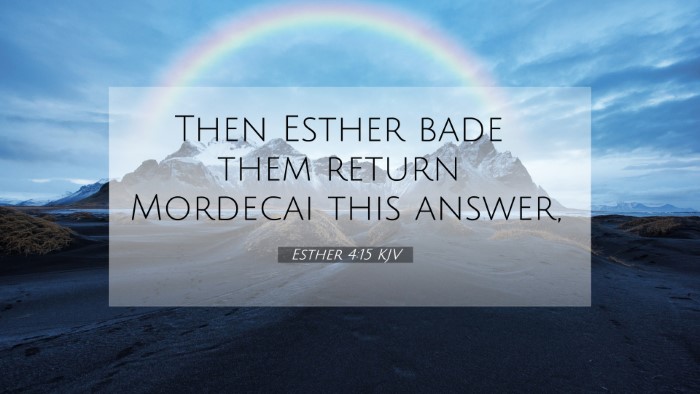Old Testament
Genesis Exodus Leviticus Numbers Deuteronomy Joshua Judges Ruth 1 Samuel 2 Samuel 1 Kings 2 Kings 1 Chronicles 2 Chronicles Ezra Nehemiah Esther Job Psalms Proverbs Ecclesiastes Song of Solomon Isaiah Jeremiah Lamentations Ezekiel Daniel Hosea Joel Amos Obadiah Jonah Micah Nahum Habakkuk Zephaniah Haggai Zechariah MalachiEsther 4:15 Similar Verses
Esther 4:15 Cross References
Then Esther bade them return Mordecai this answer,
Uncover the Rich Themes and Topics of This Bible Verse
Listed below are the Bible themes associated with Esther 4:15. We invite you to explore each theme to gain deeper insights into the Scriptures.
Esther 4:15 Cross Reference Verses
No cross reference images were found in our system for this Bible passage.
Esther 4:15 Verse Analysis and Similar Verses
Understanding Esther 4:15
Esther 4:15 offers profound insights into the bravery and resolve of Esther as she responds to Mordecai's call to act for her people during a time of peril. This verse reads, "Then Esther told them to reply to Mordecai." Here, we will explore the verses' meanings and connections through interpretations from various public domain commentaries.
Verse Context and Significance
In the context of the Book of Esther, this verse signifies a crucial turning point. The Persian Empire at the time posed a grave threat to the Jewish community, and Esther, a Jewish queen, is faced with the daunting decision to approach the king on behalf of her people. Her response to Mordecai is not merely administrative; it represents her inner struggle and commitment to advocate for those in need.
Commentary Insights
Experts such as Matthew Henry, Albert Barnes, and Adam Clarke offer valuable insights into this passage:
- Matthew Henry: He emphasizes the importance of Esther's courage and her willingness to act despite the risks. Henry notes that her initial response indicates both her deliberation and the gravity of the situation she faces.
- Albert Barnes: Barnes discusses the significance of Esther's response as a calculated yet brave decision to confront authority. He highlights the faith involved in her actions, suggesting that her resolve is bolstered by her understanding of her unique position.
- Adam Clarke: Clarke interprets Esther's choice to seek guidance from Mordecai as a model of humility and dependence on wise counsel. He elaborates on the communal aspect of faith and action in the face of adversity.
Cross-Referencing Biblical Texts
This verse is rich in connections and parallels throughout Scripture. Here are several cross-references associated with Esther 4:15:
- Esther 4:1-14: The broader narrative leading to Esther's decision, revealing the depth of the crisis faced by the Jewish people.
- Daniel 1:8: Daniel’s commitment to his faith in a foreign land draws a parallel to Esther's situation.
- Proverbs 24:11: Highlights the call to rescue those being led away to death, akin to Esther's mission.
- Philippians 4:13: "I can do all things through Christ who strengthens me," reflecting the divine empowerment that often accompanies acts of faith.
- Romans 8:31: "If God is for us, who can be against us?" emphasizes the courage found in divine support akin to Esther's reliance on faith.
- 1 Peter 3:14: "But even if you should suffer for righteousness' sake, you will be blessed," which provides a perspective on courageous advocacy like Esther's.
- Exodus 3:10: God’s call to Moses highlights the theme of strong leadership in facing oppression, paralleling Esther's role as a leader among her people.
Thematic Connections between Bible Verses
Esther 4:15 connects with many themes in Scripture, such as:
- The call to action against injustice.
- The role of women in God's plan, seen in the examples of Deborah (Judges 4:4) and Miriam (Exodus 15:20).
- Faithfulness in adversity, as demonstrated in the lives of Joseph (Genesis 39) and David (1 Samuel 17).
- The importance of community and counsel, seen in Galatians 6:2 regarding bearing one another's burdens.
Application and Reflections
Esther 4:15 prompts modern readers to reflect on their courage and willingness to act for others, especially in difficult circumstances. It encourages believers to:
- Seek divine guidance in times of decision-making, as Esther did, indicating the importance of prayer and consultation.
- Stand up against injustice in society, recognizing when to advocate for others, paralleling Esther's actions to save her people.
- Embrace personal responsibility as a calling in God’s plan, urging individuals to respond actively to the needs around them.
- Recognize the power of community in overcoming challenges, echoing the support systems evident in Esther's story.
Conclusion: The Legacy of Esther's Choice
Esther 4:15 serves as a significant exhortation for courage and decisive action, reminding believers that their role in God’s narrative can lead to profound impact. The scripture encourages an examination of how one’s faith can translate into action for the marginalized and oppressed.
SEO Keywords Summary
In exploring Esther 4:15, we also uncover relationships between various scriptures, providing a backdrop for cross-referencing biblical texts. Understanding how Esther interacts with themes of justice, community action, and faith enhances our Bible study methodologies.


